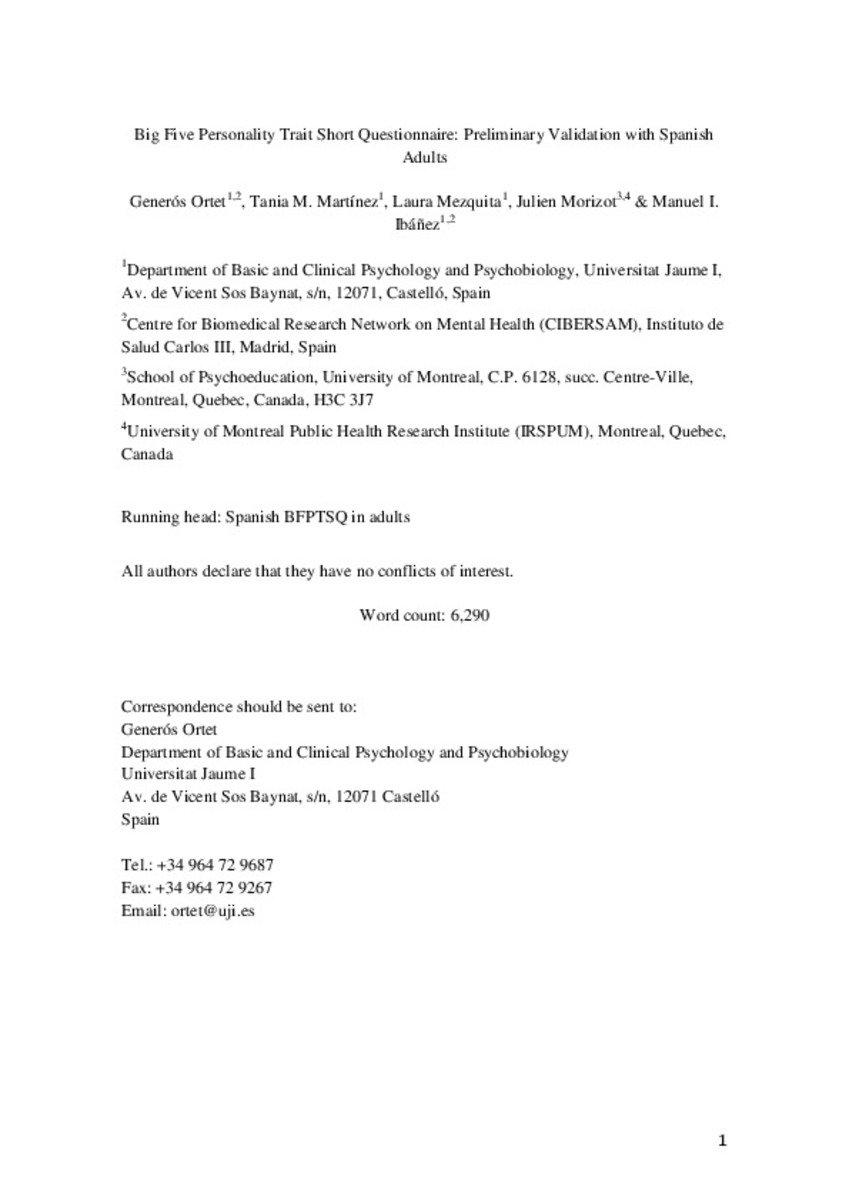Mostrar el registro sencillo del ítem
Big Five Personality Trait Short Questionnaire: Preliminary Validation with Spanish Adults
| dc.contributor.author | Ortet, Generós | |
| dc.contributor.author | Martínez, Tania M. | |
| dc.contributor.author | Mezquita, Laura | |
| dc.contributor.author | Ibáñez, Manuel I | |
| dc.date.accessioned | 2017-04-25T18:51:23Z | |
| dc.date.available | 2017-04-25T18:51:23Z | |
| dc.date.issued | 2017 | |
| dc.identifier.citation | ORTET, Generós, et al. Big Five Personality Trait Short Questionnaire: preliminary validation with Spanish adults. The Spanish Journal of Psychology, 2017, vol. 20 | ca_CA |
| dc.identifier.issn | 1138-7416 | |
| dc.identifier.issn | 1988-2904 | |
| dc.identifier.uri | http://hdl.handle.net/10234/167267 | |
| dc.description.abstract | There are two major advantages of the Big Five Personality Trait Short Questionnaire (BFPTSQ) over other non-commercial short Five-Factor Model personality measures: widen conceptual breadth, and its use in both adolescents and adults. The aim of this study was to explore the psychometric properties of this questionnaire in an adult Spanish sample. Factor, convergent (using the NEO-PI-R), and criterion (using scales that assess happiness and alcohol consumption) validities, internal consistency as well as test-retest reliabilities of the BFPTSQ were evaluated. The sample was composed of 262 participants; a subsample of 71 individuals also answered the NEO-PI-R, and another subsample of 42 respondents filled the BFPTSQ out again a month later. The results indicated that the expected factor structure was recovered using exploratory structural equation modeling (ESEM). The ESEM showed satisfactory fit indices, with CFI and TLI around .90, as well as RMSEA and SRMR below .06. Moreover, coefficient alphas ranged from .75 to .85 and test-retest correlations ranged from .72 to .93 (p < .001). Regarding the associations of BFPTSQ with NEO-PI-R scales, the correlations with the broad-trait scales ranged from .57 to .80 (p < .001), and 27 out of 30 correlations with the facet scales were significant (p < .05 or lower). We also found that extraversion and emotional stability were associated with subjective well-being (p < .001), and extraversion and conscientiousness were related to alcohol consumption (p < .01). This study supports the construct validity of the Spanish version of the BFPTSQ in adults. | ca_CA |
| dc.format.extent | 28 p. | ca_CA |
| dc.format.mimetype | application/pdf | ca_CA |
| dc.language.iso | eng | ca_CA |
| dc.publisher | Cambridge University Press | ca_CA |
| dc.relation.isPartOf | The Spanish Journal of Psychology, 2017, vol. 20 | ca_CA |
| dc.rights | © Universidad Complutense de Madrid and Colegio Oficial de Psicólogos de Madrid 2017 | ca_CA |
| dc.rights.uri | http://rightsstatements.org/vocab/InC/1.0/ | * |
| dc.subject | BFPTSQ | ca_CA |
| dc.subject | Five-Factor Model | ca_CA |
| dc.subject | Psychometric properties | ca_CA |
| dc.subject | Short questionnaire | ca_CA |
| dc.subject | Spanish version | ca_CA |
| dc.title | Big Five Personality Trait Short Questionnaire: Preliminary Validation with Spanish Adults | ca_CA |
| dc.type | info:eu-repo/semantics/article | ca_CA |
| dc.identifier.doi | https://doi.org/10.1017/sjp.2017.8 | |
| dc.rights.accessRights | info:eu-repo/semantics/openAccess | ca_CA |
| dc.relation.publisherVersion | https://www.cambridge.org/core/journals/spanish-journal-of-psychology/article/div-classtitlebig-five-personality-trait-short-questionnaire-preliminary-validation-with-spanish-adultsdiv/FD82EBB6637BE11DB90A92CD58413373 | ca_CA |
| dc.type.version | info:eu-repo/semantics/submittedVersion | ca_CA |
Ficheros en el ítem
Este ítem aparece en la(s) siguiente(s) colección(ones)
-
PSB_Articles [1293]
Articles de publicacions periòdiques







